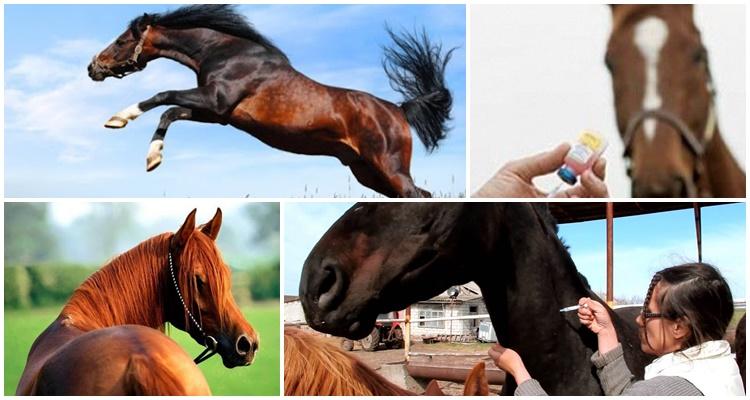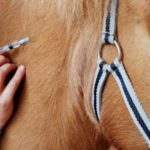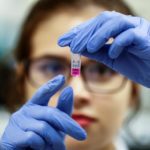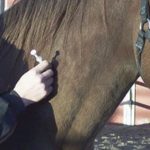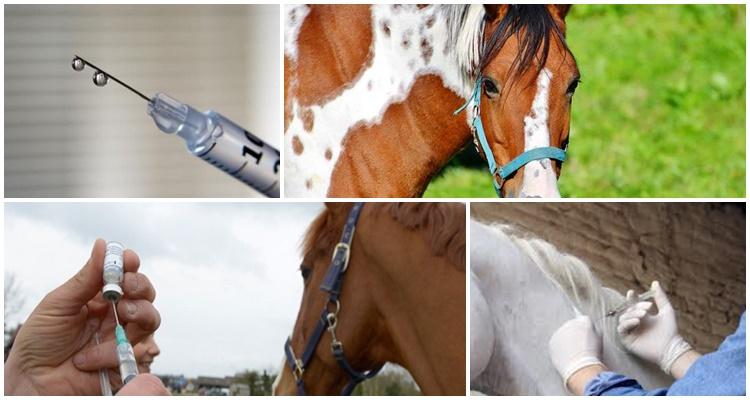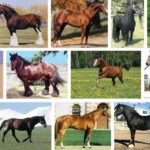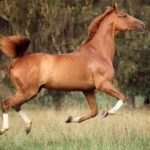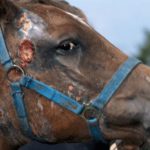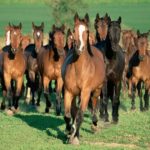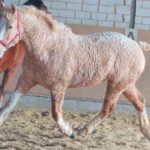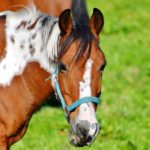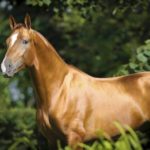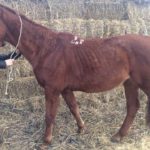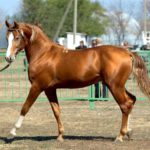Infectious diseases in horses can spread quickly and affect entire stables. Sick animals lose their ability to work, sports animals cannot train and get results. Some horse diseases can be transmitted to humans. Diseases can be prevented through vaccination. Let's consider the horse vaccination scheme, mandatory vaccinations and examinations. What complications can occur after vaccinations?
- What vaccinations are given to horses?
- Anthrax injection
- Examination for glanders, breeding disease and INAN
- Vaccination or test for leptospirosis
- Equine influenza virus injection
- Prevention of dermatophyte pathologies
- Injection against horse rhinopneumonia
- Prevention of brucellosis, tetanus, rabies
- Test for the presence of tuberculosis bacillus in the body
- From worms
- Can there be complications?
What vaccinations are given to horses?
There are mandatory vaccinations that are given to all horses. They must be noted in the animal’s veterinary certificate and are necessary for its movement from one region to another. According to the veterinary rules for transporting horses across the territory of the Russian Federation, sporting animals that have a passport from the Equestrian Sports Federation or the Institute of Horse Breeding must be vaccinated against:
- horse flu (every six months);
- anthrax (once a year);
- lichen (once a year).
Once every six months they must undergo examinations for glanders, breeding disease, and INAN.
Anthrax injection
Prevention of this disease begins when foals are 9 months old. It is carried out once a year, using a vaccine from strain 55-VNIIVViM and K79-Z.
Examination for glanders, breeding disease and INAN
Venous blood is taken from horses, which is then examined in the laboratory. Sports animals are examined 2 times a year, the rest - once a year. There are no vaccines against these diseases.
Vaccination or test for leptospirosis
Vaccination or blood testing for the presence of this disease is also carried out once annually. The choice of method depends on how prosperous the farm is and the region where the animals live.
Equine influenza virus injection
Domestic and foreign inactivated drugs are used for viral infections. Frequency: twice a year. The dosage is set according to the epidemiological situation in the region.
Prevention of dermatophyte pathologies
In veterinary practice, various drugs, inactivated and live vaccines, are used. They create different immunity. Vaccination is carried out in 2 stages with an interval of 10-15 days. Frequency – 1 time per year.They begin to vaccinate 3-month-old foals.
Only healthy animals can be vaccinated; if a fungus is already present in the horse’s body, an exacerbation of the disease will occur after the pathogen is managed. Bald areas may appear on the animal's skin and itching may begin. In farms where infection with microsporum and trichophyton has been noted, horses are given a medicinal dose, not a prophylactic one.
Injection against horse rhinopneumonia
In Russia, a dry vaccine has been developed from the SV/69 virus strain; there are also foreign options, such as Equilis Resequin and Pnevmequin. They are not used everywhere, but only in areas where there is a threat of morbidity. The drug is injected into the muscles twice, with an interval of 3-4 months, and repeated annually.
Pregnant mares whose pregnancy period is more than 7 months cannot be vaccinated. Foals are vaccinated from 3 months.
Prevention of brucellosis, tetanus, rabies
In regions unfavorable for these infections, horses are given additional vaccinations. Domestic and foreign-made drugs are used that are used for all types of animals. Frequency – 1 or 2 times a year.
Test for the presence of tuberculosis bacillus in the body
Despite the low prevalence of this disease among horse farms in Russia, veterinarians recommend conducting research every year. This applies to both external manifestations of infection and laboratory confirmation.
From worms
Prevention of helminthiasis is carried out with drugs that contain ivermectin.The substance is effective against ascariasis, oxyurosis and strongyloidiasis and other helminths caused by roundworms. The drugs are effective in the treatment of gastrofilosis and some protozoal diseases. The drugs are given to horses along with food in a dosage of 0.3-0.4 mg/kg, or they are injected once into the muscles at a dose of 0.2 mg/kg.
They also give medications that kill nematodes. Treatments for roundworms and nematodes are alternated and given annually. Prevention of infection with tapeworms is carried out before the spring pasture of horses. Animals are fed "Fenasal" in an amount of 200-300 mg/kg.
Can there be complications?
Complications often arise if animals that are not completely healthy are vaccinated. They may have a fever, experience exacerbations of chronic diseases, and weakness. In this state, vaccinations are not given to animals. After vaccination, the animal’s body may react with an allergic reaction to the introduction of the pathogen, which is expressed in an increase in temperature, swelling and redness at the injection site, and rashes.
To reduce the likelihood of complications, horses are released from work or training for a day or several after vaccination and fed a smaller amount of concentrates. If signs of an allergy appear, the horse should be shown to a veterinarian.
Vaccination is a mandatory procedure for owners sports and working horses. Animals are vaccinated every year against the most dangerous viral infections that can spread among livestock in various stables. Vaccinated individuals develop immunity that helps them cope with infection when it occurs. Universal vaccination of horses gives hope that the disease can be stopped and not lead to an epidemic.

